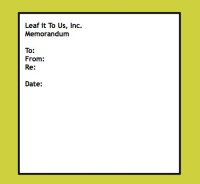Peer review on rain garden memo/DUE FRIDAY
in hard copy, double spaced, and stapled. 
More handouts for us to think about predicates and paragraphs. First up, the predicate or verb (where the action or condition is -- state of being):
And, on to paragraphs:
Memo details:
- Format
- Using first person and third person voices skillfully in memos and professional communication
- open and close with one or two sentences
- let body of memo be third person
- DO NOT ADDRESS JANE. You do not need to. Why? The answer concerns the work context, within the efficiency of internal communication -- hence the memo format. In other words, a memo is not a letter
What is a memo?
 By the way, the OWL website at Purdue is a fabulous resource for writing. Memos also have a standard format: See the image to the left. Also, look at the email heading in your software. This electronic message is based on the memo format. Bonus question: what is the difference, traditionally, between a memo and a letter?
By the way, the OWL website at Purdue is a fabulous resource for writing. Memos also have a standard format: See the image to the left. Also, look at the email heading in your software. This electronic message is based on the memo format. Bonus question: what is the difference, traditionally, between a memo and a letter?
Topic Sentences: A list of qualities for you to strive for
- Usually a short direct sentence (think announcement)
- Signals the topic in the paragraph (think preview)
- Hooks the reader by 1) raising a question or 2) provoking thought
- Can be placed anywhere, but early on in the paragraph is the best default strategy for most professional documents; in other words, at the beginning of the paragraph
- Contains an element of transition from the previous paragraph
Note: topic sentences can be implied in tightly coherent prose (for now, leave this subtle technique to the professionals!)
PREVIEW OF COMING ATTRACTIONS: In about two weeks, we will start looking at two research articles, your choice, for the third assignment -- close review. To prepare, over the weekend, look at these readings. I think these short pieces will help you in your other classes, to skim, to focus, to master content. Perhaps, attention to reading will help you prep for exams.
First, you should have by now communicated with me about your two articles. You will review them in assignment that will begin the last week in February. READ THEM this week, however. Thinking about reading (especially technical literature) can help you in your classes.
Here is a grid to help you organize your reading (for our assignment, but this grid will help you with many peer reviewed papers often set as reading in upper division science classes). A tight article has more granular focus: research results, for example; A loose article is broader, with the classic example a literature review.. Increasingly, scientists and professors are self-reflective about reading scientific literature. And, also biomedical professionals. This is a very good "list" approach to reading all scientific literature.
Reader Comments